Serengeti National Park, also a UNESCO World Heritage Site, is one of Africa’s most famous wildlife reserves. Surrounding expansive plains, this Tanzanian gem is renowned for its rich biodiversity and the great migration of many wildebeests and zebras crossing its terrain. With diverse ecosystems, including savannahs and riverine forests, Serengeti has long served with a top game-viewing experience, which includes the famous “Big Five.” For an exhilarating experience, photographers, nature lovers, and adventure seekers alike must visit the national park.
Quick Facts
Location: Northern Tanzania, Serengeti District, Mara Region
Timings: 6 AM – 6 PM
Entry Fees: $60 for adults and $20 for children (per person, per day)
How To Reach: accessible by air, road, and rail
Nearest Airport: Seronera Airstrip (66 km); Kilimanjaro International Airport (295 km)
Nearest Railway Station: Arusha Railway Station (234 km)
Best Time To Visit: June to October
Where To Stay: Woodlands Camp Serengeti, Osero Serengeti Tented Camp, Mbali Mbali Soroi Serengeti Lodge, Serengeti Mawe Tented Camp, Zawadi Camp and more.
Where To Eat: Impala and Rhino Restaurant and Boma
Location
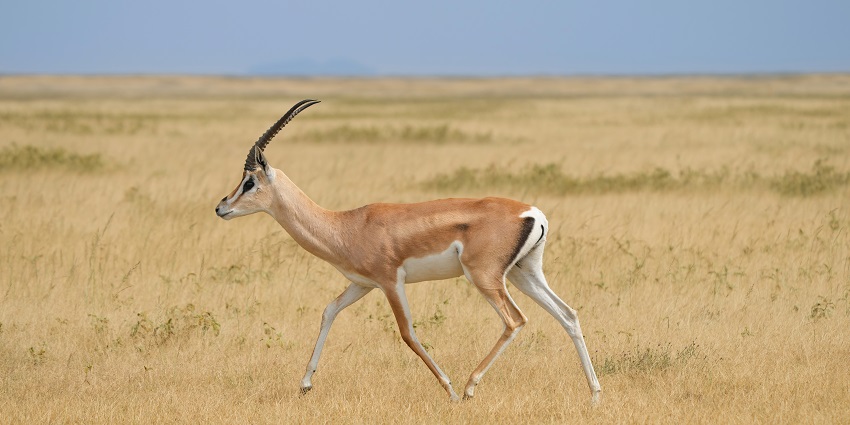
Photo: Giles Laurent / Wikimedia Commons
Serengeti National Park lies in the Serengeti District of the Mara Region in northern Tanzania. The Seronera, the central hub of the park, sits amid acacia tree-dotted endless plains. Ngorongoro Conservation Area lies to the southeast of the park and borders Maswa Game Reserve to its southwest. Other important landmarks include the Grumeti River and Ikoma Gate, which is an access point. Isenye Village is close to the park, giving you a real feel for travelling through the village life.
Suggested Read: Best National Parks In Tanzania
How To Reach
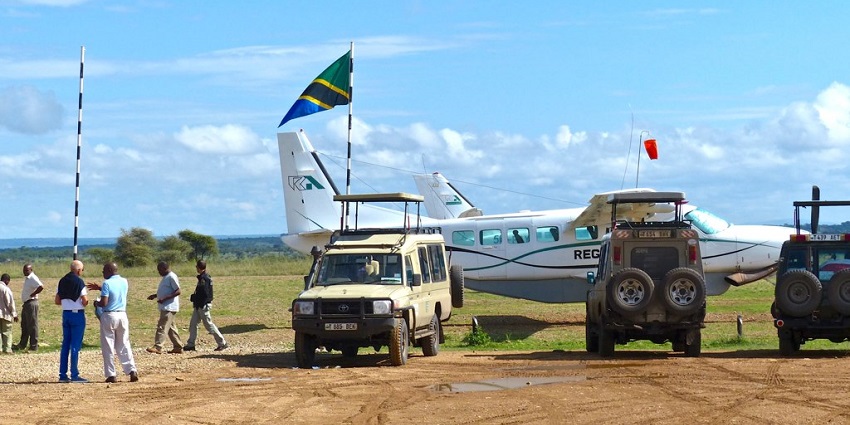
Photo: Roman Boed / Wikimedia Commons
By Air: Arrive at Kilimanjaro International Airport or Arusha Airport, which is 295 km from the park, followed by a charter flight to the Seronera Airstrip within the park.
By Rail: The nearest railway station is Arusha Railway Station, which is approximately 250 km away. From there, you can either rent a car or take a bus to the park area.
By Road: Serengeti National Park is 230 km from Arusha, which is a 7-hour drive, or you can reserve a spot on a guided safari trip.
Things To Do
1. Witness The Great Migration
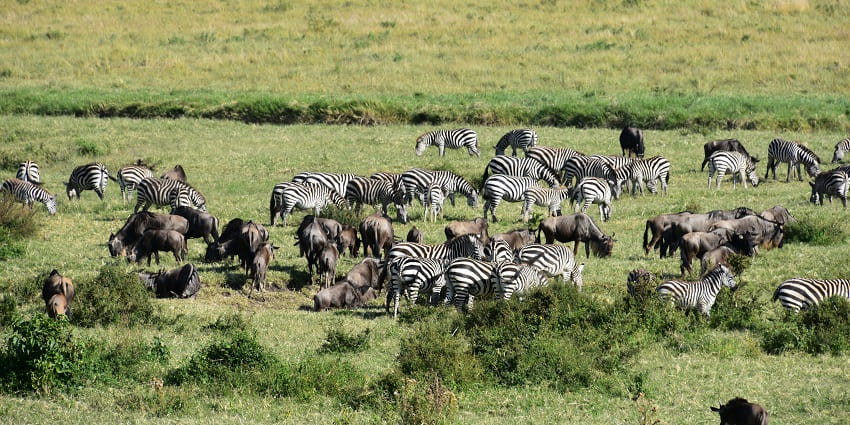
Photo: Richard Mortel / Wikimedia Commons
Take a safari to witness the incredible Great Migration, where more than a million wildebeests, zebras, and gazelles cross the Serengeti plains. Best viewed between July and October near the Mara River, this spectacle is a great display of dramatic river crossings and predator-prey interactions. Safari guides can be of great help to you. Take an early morning game drive for the best view and photography. Predators like lions and crocodiles lie in wait for their prey, creating a moment of raw, untamed nature. The thunder of hooves and a sense of survival make the experience unforgettable.
Suggested Read: Explore Kilimanjaro National Park
2. Hot Air Balloon Safari
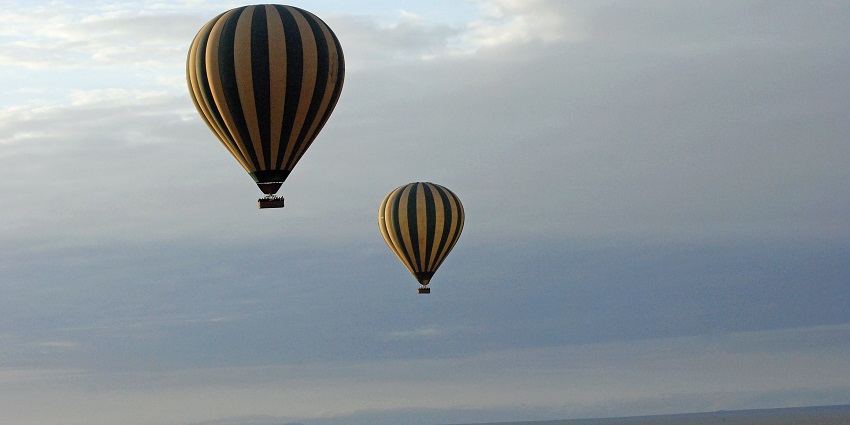
Photo: Harvey Barrison / Wikimedia Commons
Soar over the Serengeti’s vast expanse on a hot-air balloon ride. Flights typically launch at dawn, providing breathtaking views of golden savannahs, grazing herds, and sunrise-lit landscapes. The one-hour ride concludes with a champagne breakfast in the greenery. Advanced booking is recommended, especially if you’re planning in peak seasons. As you drift silently above, witness wildlife from a unique perspective, spotting elephants, giraffes, and even predators in their natural habitat. This serene yet thrilling adventure is a must for photographers and those seeking a romantic or once-in-a-lifetime experience.
3. Explore Seronera Valley
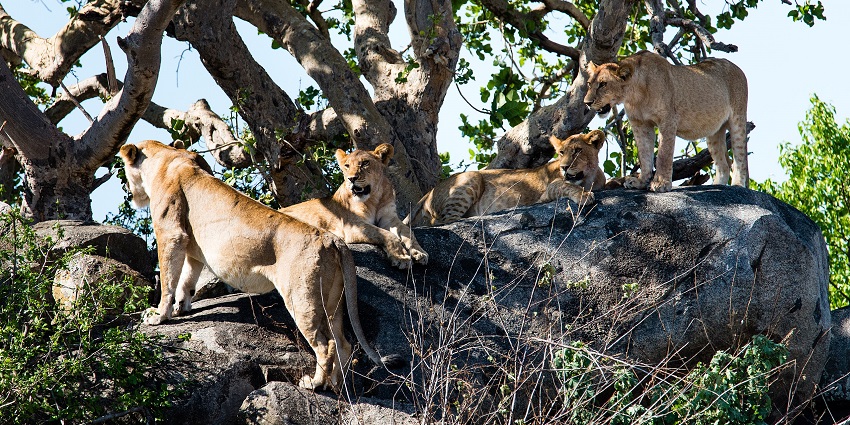
Photo: Christoph Strässler / Wikimedia Commons
Known as the park’s “big cat capital,” Seronera Valley is a prime location to observe lions, leopards, and cheetahs. This lush valley, nourished by the Seronera River, also hosts hippos, elephants, and diverse bird species. Guided game drives in this area offer unparalleled opportunities for close encounters with wildlife. The abundance of prey animals makes it a hotspot for predator activity, ensuring action-packed game drives. Bird enthusiasts can also enjoy spotting colourful species like the lilac-breasted roller in the valley’s scenic beauty.
Suggested Read: Explore Ruaha National Park Tanzania
Places To Visit Near Serengeti National Park
1. Ngorongoro Crater
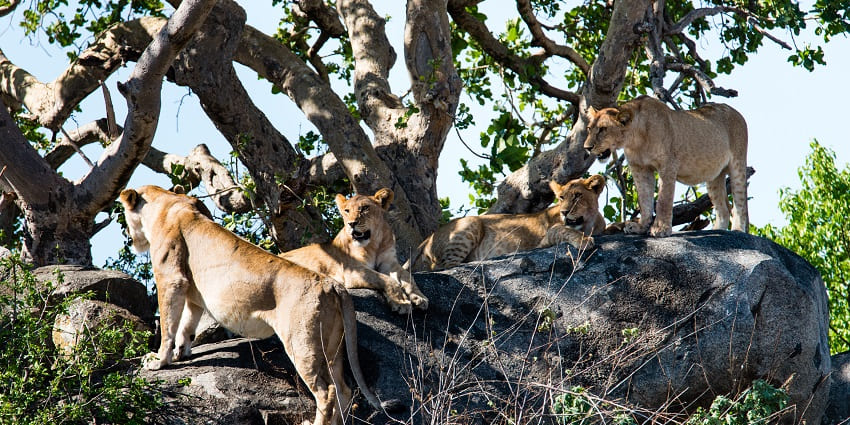
Photo: William Warby / Wikimedia Commons
Ngorongoro Crater, a UNESCO World Heritage Site, is a gigantic volcanic caldera and one of the most biodiverse spots on Earth. Over 25,000 animals call it home, including endangered species such as black rhinos and cheetahs. You are taken through guided game drives to spot elephant herds, lions, and flamingos scattered around the crater lakes. Bird lovers can enjoy exploring rich ornithological diversity while cultural tours help gain knowledge about the Maasai people. The Crater Rim gives panoramic views of this ecological wonder, and it is never to be missed by anyone who loves wildlife or history.
Timings: 6 AM – 6 PM
Distance From The Park: 60 km
2. Lake Manyara National Park
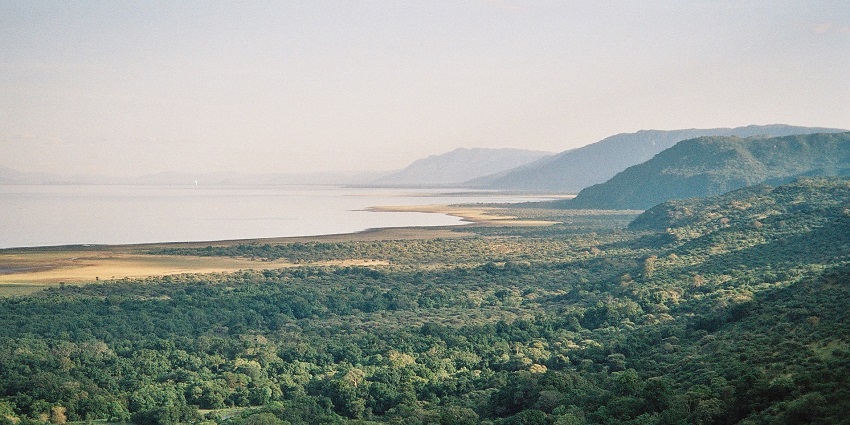
Photo: Clem23 / Wikimedia Commons
Known for its iconic tree-climbing lions and hundreds of flamingos, Lake Manyara National Park has plenty to see and do. The park features geothermal hot springs that form unique natural pools and an astonishing groundwater forest full of baboons, blue monkeys, and exotic birds. When the lake isn’t frozen over, seasonal canoeing offers a peaceful way to spot aquatic critters, such as hippos. If you wish, you can visit the vibrant Mto wa Mbu village next to the park, famous for its Maasai market, Tanzanian cuisine, and cultural tours bringing you close to local life. Lake Manyara’s small but diverse ecosystem makes it an iconic stop.
Timings: 6 AM – 6 PM
Distance From The Park: 100 km
Suggested Read: Tarangire National Park
3. Grumeti Game Reserve
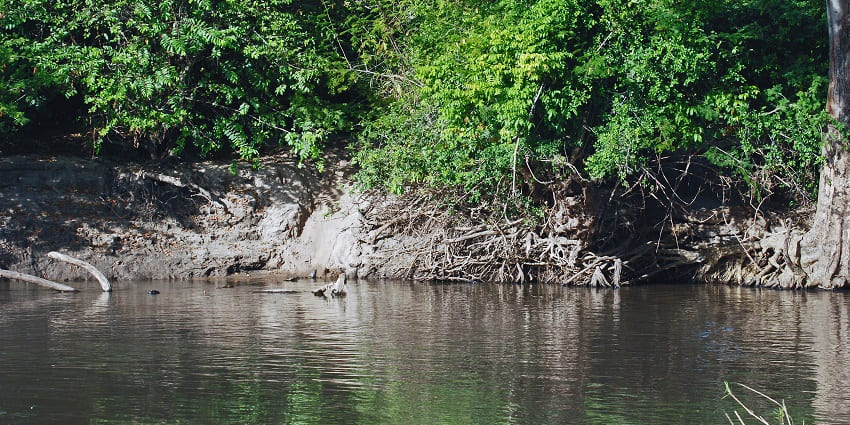
Photo: Harvey Barrison / Wikimedia Commons
On the border of Serengeti, this private reserve offers exclusive safari experiences with night drives and walking safaris. The central feature of the reserve is the Grumeti River, which attracts crocodiles, hippos, and other wildlife to the river during the dry season. This makes it one of the most exclusive combinations of comfort and adventure with personal pools, gourmet dining, and game drives at luxury lodges like Singita Grumeti Reserve Lodges. The dry season is the time when you can see some unique wildlife spectacles, like large herds of wildebeest gathering by the river.
Timings: 6AM – 6 PM
Distance From The Park: 40 km
4. Olduvai Gorge
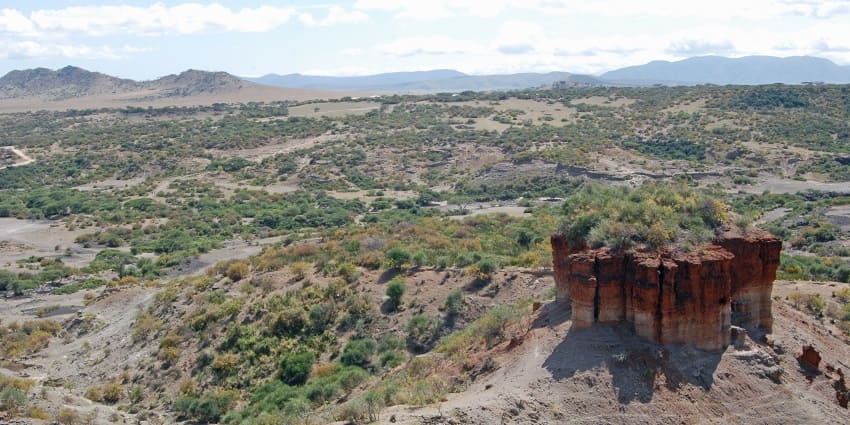
Photo: Harvey Barrison / Wikimedia Commons
Olduvai Gorge is a window into our prehistoric past, making it an important archaeological site where fossils of early humans were found. The site has a museum that exhibits fossils, tools, and information about early human evolution. Some of the most important artefacts are the remains of Homo habilis and ancient stone tools, both of which have tremendous value for studying human history. Guided tours take you to excavation sites and also provide interactive experiences with archaeologists who discuss their work. Apart from its layered sedimentary rock formations, Olduvai Gorge provides quite a contrast to the Serengeti Plains.
Timings: 8 AM – 5 PM
Distance From The Park: 40 km
Suggested Read: Selous National Park Tanzania
5. Maswa Game Reserve
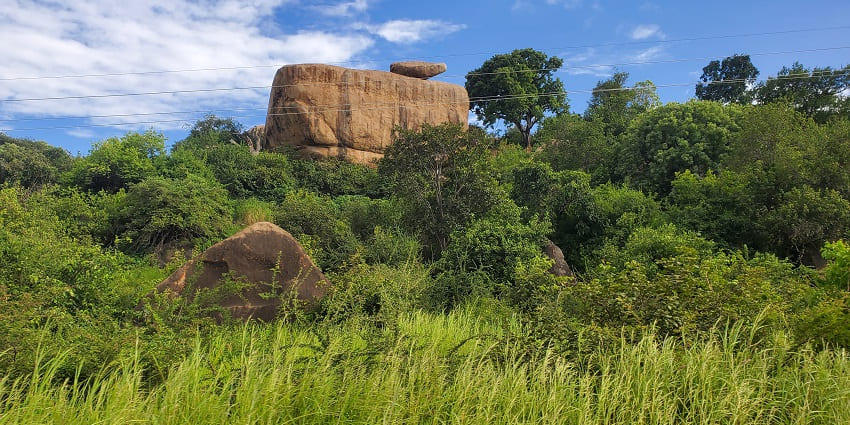
Photo: Kim Tz / Wikimedia Commons
This beautiful reserve located to the south of Serengeti offers an exciting safari adventure away from the crowds. Its ecosystems vary from thick woodlands to expansive grassy plains and provide homes for species that are scarce, such as roan antelope and African wild dogs. The birdwatcher’s paradise offers many sightings, such as that of the Kori bustard and secretary bird. You can go on guided walking safaris, which give a very personal experience with nature. The serenity of Maswa’s untouched landscapes is a haven for those who seek a quiet escape from the busy tourism of Serengeti.
Timings: 6 AM – 6 PM
Distance From The Park: 100 km
Other Factors To Consider
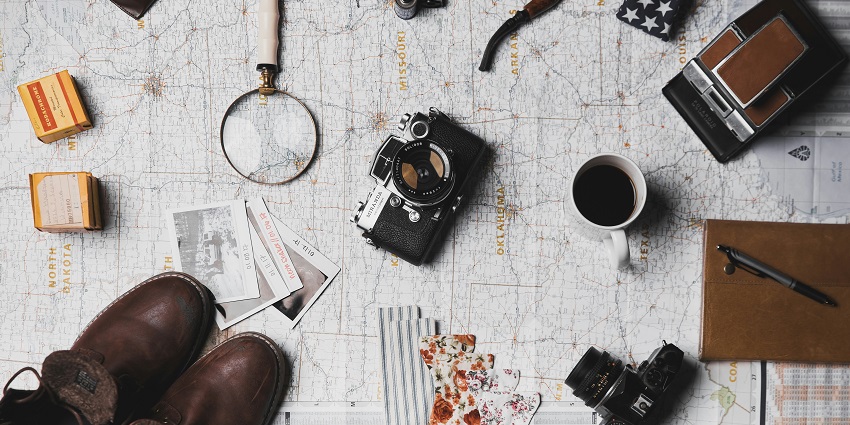
Photo: ian dooley / Unsplash / Image For Representation Only
Average Cost Of The Trip
Plan on budgeting roughly $250-500 a day in park fees, guided safari, and accommodation costs. For luxury, the price can go as high as $1,000 per day. Mid-range lodges and campgrounds are available for budget travellers. Expect to incur extra costs, like transportation, meals, and tips.
Tips For Travellers
- Binoculars, sunblock, and insect repellent are travel necessities.
- Wear neutral-coloured clothing to blend in without alarming animals.
- Park regulations must always be followed and respected in dealing with wildlife.
- It is advisable to book accommodations and safaris in advance of high seasons.
Suggested Read: Top Places To Visit In Tanzania
Whether you’re in pursuit of the Great Migration or peaceful moments, Serengeti National Park is one of the must-go places for its extraordinary wildlife experiences, beautiful landscapes, and rich cultural value. Be it the “Big Five,” golden savannahs, or a peaceful hot air balloon safari, Serengeti guarantees some unforgettable moments. Create lifetime memories and plan a trip with TripXL to Serengeti today.
Cover Photo: Giles Laurent / Wikimedia Commons


 WhatsApp
WhatsApp
 Twitter
Twitter









